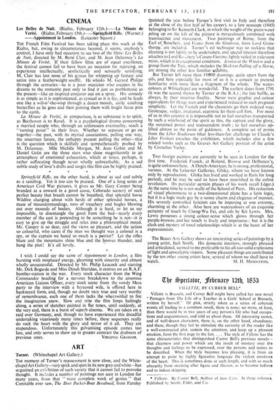CINEMA
Les Belles de Nuit. (Rialto, February 12th.)—La Minute de Verite. (Rialto, February 15th.)—Springfield Rifle. (Warner.) —Appointment in London. (Leicester Square.) THE French Film Festival has been taking place this week at the Rialto, but, owing to circumstances beyond, it seems, anybody's control, I have only had occasion to see two of the films: Les Belles de Nuit, directed by M. Rene Clair, and M. Jean Delannoy's La Minute de Verne. if their fellow films are of equal excellence, the festival cannot fail to have been an occasion for rejoicing, an experience intellectually, aesthetically and sensually satisfying. M. Clair has lost none of his genius for whipping up fantasy and satire into a featherweight soufflé. He whisks M. Gerard Philipe through the centuries—he is a poor musician who escapes in his dreams to the romantic past only to find it just as problematic as the present—like an inspired conjuror out on a spree. His comedy is as simple as it is sophisticated, as cynical as it is fey, and he leads one like a will-o'-the-wisp through a dozen moods, airily catching butterflies as he goes and then pinning them with bright fierce pins to the earth.
La Minute de Verite, in comparison, is as substance is to spirit, as Beethoven is to Ravel. It is a psychological drama concerning a married couple who, through an unforeseen eventuality, reach a "turning point" in their lives. Whether to separate or go on together—the past, with its myriad associations, pulling one way, the uncertain future, the unhappy present pulling the other—that is the question which is skilfully and sympathetically probed by M. Delannoy. Mlle Michele Morgan, M. Jean Gabin and M. Daniel Gelin are the three stars who shine magnificently in an atmosphere of emotional exhaustion, which at times, perhaps, is rather suffocating though never wholly unbreathable. As a sad subtle study of love's drifts and surges this film can be highly praised.
•
Springfield Rifle, on the other hand, is about as sad and subtle as a sandbag. Yet it too can be praised. One of a long series of American Civil War pictures, it gives us Mr. Gary Cooper being branded as a coward in a good cause, Colorado scenery of such perfect beauty that breath cannot be breathed, that splendid horse Wildfire charging about with herds of other splendid horses, a maze of misunderstandings, tons of treachery and bugles blowing out over mounds of bodies. Although it is hard, or let us say impossible, to disentangle the good from the bad—nearly every member of the cast is pretending to be something he is not—it is easy to give up the struggle and relax into a philosophical mood. Mr. Cooper is so dear, and the views so pleasant, and the action so colourful, who cares if the man we thought was a colonel is a spy, or the captain we hated so much is a patriot? Let the rifles blaze and the mountains shine blue =and the hooves thunder, and hang the plot! It's all lovely.
I wish I could say the same of Appointment in London, a film bursting with misplaced energy, gleaming with sincerity and almost wholly unsuccessful. Directed by Mr. Philip Leacock and starring Mr. Dirk Bogarde and Miss Dinah Sheridan, it centres on an R.A.F. bomber-station in the war. Every stock character from the Wing Commander heading for a nervous breakdown to the amorous American Liaison Officer, every stock scene from the rowdy Mess party to the interview with a bereaved wife, is offered here in hackneyed form, and, though no doubt very true and very worthy of remembrance, each one of them lacks the wherewithal to fire the imagination anew. Slow and trite the film limps haltingly along, a series of sketches painted in flat tones, until suddenly, at the very end, there is a burst of superb cinema. We are taken on a raid over Germany, and, though we have experienced this dreadful undertaking vicariously many times before, these sequences really do rock the heart with the glory and terror of it all. They are stupendous. Unfortunately this galvanising episode comes too late, and only serves to show up in greater contrast the drabneks of


































 Previous page
Previous page